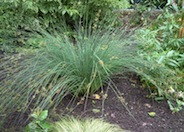
Common name:Dymondia, Rock Ditty
Botanical name:Dymondia margaretae
This foliage is gray/green/silvery; it is a very dense, mat forming groundcover. It tolerates drought, cold, salt spray and poor soils. It's deep rooted and produces small, inconspicuous yellow flowers. Rock Ditty is great for use in between stepping stones or pavers.

Common name:Waxleaf Privet
Botanical name:Ligustrum japonicum 'Texanum'
This dense evergreen shrub of an upright habit is capable of growing as a shrub or small tree. Its dark green, leathery leaves are opposite those of a simple evergreen plant.

Common name:Lindheimer's Muhly
Botanical name:Muhlenbergia lindheimer
Native to Mexico and Texas this stunning clump forming grass is winter dormant grass in cold climates, but usually semi-deciduous in mild climates. From the fall into winter emerge the 5 ft tall upright flower inflorescence, that rise well above the blue-gray foliage. The flowers are at first purple then mature to a gray color. Best in full sun with regular watering but will tolerate drought and light shade. -Randy Baldwin
San Marcos Growers

Common name:Blue Fescue, Blue Fescuegrass
Botanical name:Festuca glauca
This groundcover/grass will grow less than 1' tall and has small, blue green leaves.

Common name:California Gray Rush
Botanical name:Juncus patens
Although a wetland plant, Juncus patens can tolerate fairly dry conditions. It will slowly clump to 2'-3' wide and a height of 2'-2.5'. There are many selections of this species available with different heights and widths. It is carefree, with little to no maintenance. It provides great upright structure to many styles of landscapes.

Common name:Curly Top Sedge
Botanical name:Carex buchananii
This orange bronze ornamental grass is 2'-3' tall and 1'-2' wide and does best in full sun to part shade. It needs moderate amount of water. Blades have gentle curls. This grass looks great when planted with green or gray colored foliage plants.

Common name:Canyon Prince Wild Rye
Botanical name:Leymus condensatus 'Canyon Prince'
One of the best known and utilized native grass selections in Southern California, this beautiful, blue gray foliage spreads out 3'-4' or more. It will reach a height of 2'-3'. It rarely flowers. It does spread by rhizomes although not as vigorously as some closely related species. It can be extremely drought tolerant and care must be taken not to over water this species as it can rot from the center. Otherwise, it is carefree and requires virtually no maintenance.

Common name:Hybrid Tea Rose (selections)
Botanical name:Rosa Hybrid Tea varieties
These shrubs and vines are the most loved in the Western USA and are very resilient. They come in a wide variety of sizes and colors and are easy to maintain with proper care. They can be used in a water-conserving garden with careful attention to irrigation practices.

Common name:Eastern Redbud
Botanical name:Cercis canadensis
This small, deciduous tree with a rounded head is covered with small flowers of a rose pink color in the spring before the appearance of heart-shaped leaves. It can grow to 25' tall with an equal spread. It has a low branching habit with a rounded form. Leaves turn yellow green in the fall.

Common name:Chinese Pistache
Botanical name:Pistacia chinensis
The Pistacia chinensis is a deciduous tree with broad, spreading growth to 50' in height. Its leaves have 10-16 leaflets, and the fall coloring arrives in beautiful shades of red, orange and yellow. The young trees are often gawky, but some become shapely with age.
Sustainable Landscaping Fundamentals
Sustainable landscaping is a term coined to mean sensible landscape practices that work within the limits of the Eco-system. This means within the limits of your local rainfall, soil conditions and sun patterns.
Click in the green box for more information
| Designer: Rick Fisher | Walkway to House |
Photographer: GardenSoft |
Soils and Compost:
Practice grass-cycling by leaving short grass clippings on lawns after mowing, so that nutrients and organic matter are returned to the soil.
Water Saving Tip:
Adjust sprinklers to avoid watering sidewalks and driveways.
Integrated Pest Management:
Remove irrigation water and fertilizer from areas where you don't want weeds to grow.
